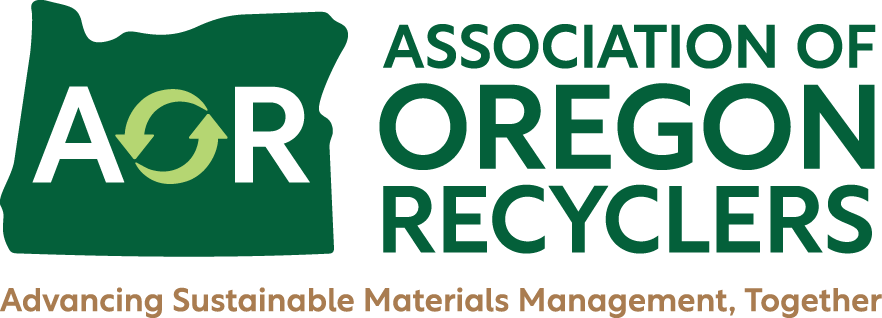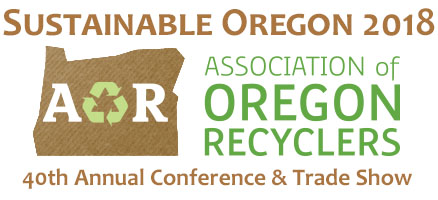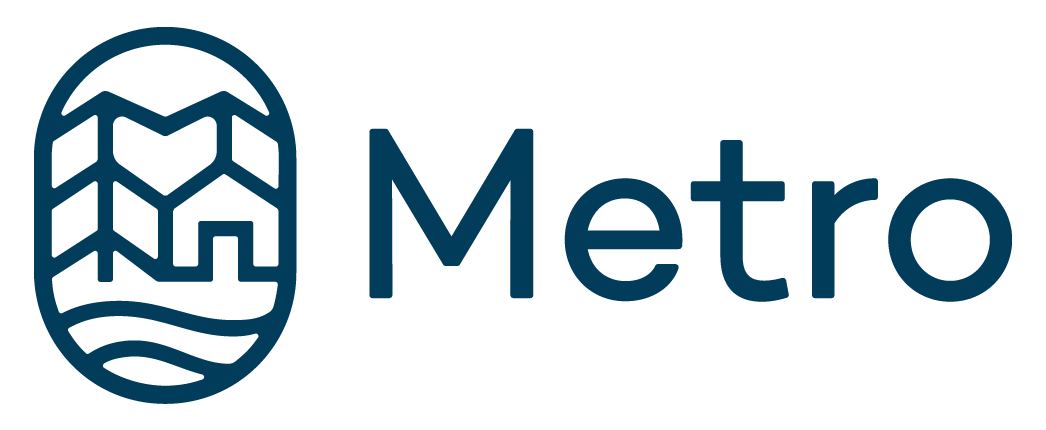2018 Conference Sessions
June 13-15 - Hilton - Eugene, OR
Looking for a quick summary of the conference schedule? Check out the AGENDA.
Looking for the PowerPoints? Check out the PRESENTATIONS.
Want to learn more about speakers and moderators? Check out the BIOS or click on a name below.
June 13 - Wednesday
The Association of Oregon Recyclers—the People Plenary
The AOR Board will take you on a journey, winding our way through the minds of AOR’s foundational members, jogging through the current AOR strategic plan, and jetting to hear more from some of our newest members as we peek into the future.
AOR Members' Foundational Perspectives
Speakers: Charlotte Becker, first AOR Resource Direcror; Lee Barrett, retired/former AOR board member; John Matthews, retired/former AOR board member; and Bruce Walker, City of Portland/former AOR board member Moderator: Jerry Powell, Resource Recycling
AOR Board Panel
Speakers: Gregg Hayward, Education Chair; Elizabeth Start, Conference Chair; and Vinod Singh, Markets Chair Moderator: Pete Chism-Winfield, Board Chair
AOR Members New Perspectives
Panelists: Caitlin Ahearn, City of Beaverton; Alfredo Gonzalez Valenzuela, City of Portland; Minal Mistry, Oregon DEQ; Susan Baker, Bend Garbage & Recycling; and Beth Vargas Duncan, ORRA Moderators: Laura Leebrick, Treasurer and Pam Peck, Legislative Chair
We Know What Goes In, What is the Cost to Get It Out? MRF Stories
At this session, we will be discussing the costs of processing recyclables and how it is affected by adding and removing materials from the stream; and prioritizing materials based on revenue, GHG, and other metrics. We will also look at how new MRFs are being designed and equipped to improve separation of commingled materials. Audience members will see case studies of successful MSW operations that have come online within the past few years.
Speakers: Lisa Skumatz, SERA and Doug Drennen, JR Miller & Assoc. Moderator: Vinod Singh, Far West Recycling
From Residents to Regulators: Coming Together to Improve Multi-Family Recycling
In this session, we will hear from a wide variety of voices. The Oregon DEQ will tell us about their recent research and stakeholder workgroup on multi-tenant recycling opportunity. Nonprofit Trash for Peace and a Home Forward resident services coordinator will discuss their partnership in implementing hands-on sustainability education for youth and families at apartment properties. We will also hear from a local Eugene resident about her experience and accomplishments as part of her townhome community’s Green Team. Join us for an engaging discussion!
Speakers: Brian Stafki, Oregon DEQ; Laura Kutner, Trash for Peace; Zahra Pike, Home Forward; and Sonja Snyder, Wild Oaks HOA in Eugene Moderator: Caitlin Ahearn, City of Beaverton
From Community Events to Creative Entrepreneurship: Reuse in Action
In this session, representatives from three Eugene-based organizations will share their experiences in supporting reuse initiatives that galvanize the public at community events and support entrepreneurs looking to make a living repairing, repurposing, and upcycling materials.
Speakers: Allie Breyer, City of Eugene; Mitra Chester, St. Vincent de Paul; and Emily Shelton, BRING Recycling Moderator: Heather Robinson, Washington County
Keynote: Paul Hawken
June 14 - Thursday
Plenary: Recycling Markets
The last year has been a story of massive disruptions in the markets for recyclable commodities, and the economics of recycling have definitely changed. The import restrictions on the trade of recyclable commodities with China has dominated the discussion for months. Come join the experts as they discuss historic trends and possible futures of the different materials and the related market environments. Materials covered will be plastics, metals, and fiber (paper) grades. End markets domestically and globally will be discussed, as well as barriers and opportunities. This session will be a recap of what has happened to recycling markets over the last year, why it happened, where they stand today, and what may happen next.
Speakers: Bernie Lee, ISRI and Peter Van Houten, Bob's Metals Moderator: Vinod Singh, Markets Chair
Aiming for Zero: The Business Case for Waste Reduction and Reuse
Zero waste is a philosophy and design framework that promotes reuse, recycling, and conservation programs, and also emphasizes the entire life cycle of products, processes, and systems. For a long time, companies pursuing zero waste depended on strong recycling markets to divert generated onsite waste.
China’s recent ban on recycling imports has altered the global recycling industry and is pushing educators, businesses, and municipalities to rethink and refocus statewide efforts to reduce waste first.
Hear from a panel of business sustainability experts on how they’ve implemented projects that have eliminated waste, saved money, and increased their completive advantage. Additionally, hear from DEQ as they highlight how the zero waste philosophy fits into the larger sustainability agenda and how, if done right, supports sustainable materials management.
The panel will highlight projects that address the following:
- Having products and packaging designed for the environment,
- Reducing the materials used in products and packaging,
- Using less toxic, more benign materials in production and manufacturing,
- Providing longer product lives by developing more durable products, and
- Having products that are reusable and/or repairable at the end of their useful life.
Speakers: Nicole Bassett, The Renewal Workshop; Shandy Carroll, Glory Bee Foods; Sue Beets-Atkinson, SBM Management; and Minal Mistry, Oregon DEQ Moderator: Angie Marzano, Lane County
Conscientious Consumption for Local Governments
Oregon—both at the state and local level—is a leader in the emerging field of consumption-based greenhouse gases: accounting for a community's global climate footprint and developing programs to reduce it. In this session, DEQ will introduce consumption-based accounting, share the results of a newly-updated emissions inventory for Oregon, discuss the implications for state and local programs and planning, and reflect on growing national and international interest in this topic.
The Eugene community is in the process of updating its Climate Action Plan, which is informed by Eugene's Community Consumption-Based GHG Emissions Inventory (CBEI). Eugene's CBEI indicates that community consumption of material goods represents a significant source of greenhouse gas emissions. To address these emissions, the City of Eugene convened four workgroups to discuss and prioritize local actions to reduce the community’s consumption-based emissions. The City of Eugene and Good Company staff will discuss the planning process, lessons learned, and the specific climate actions identified to be included in Eugene’s CAP.
Conscientious consumption doesn’t only mean using less, it also means more thoughtful sourcing. The St. Vincent de Paul Society of Lane County and BRING Recycling provide a materials management nexus through both government and private collaborations. They take stuff nobody wants and find a way to retain its embodied value. The result: a reduction in greenhouse gas emissions through creative reuse and reimagining.
Speakers: David Allaway, Oregon DEQ; Aaron Toneys, Good Company; Chelsea Clinton, City of Eugene; Carolyn Stein, BRING Recycling; and Susan Palmer, St. Vincent de Paul Moderator: Mark Nystrom, Lane County/New Stream Strategies
Measure It Right: Aligning Recycling Metrics with Sustainability Goals
Is your community questioning whether recycling really matters? Are you curious what the impact of recycling is in terms of sustainability metrics like GHG emissions? What materials offer the biggest "missed opportunities" for recycling, and which materials aren't worth the trouble? And if the traditional ways to measure recycling progress are no longer accurately capturing environmental impact, what are our best options for changing our measurement practices? This highly relevant session tackles an old question—“how do we measure what matters?”—with new research and with DEQ's 2050 Vision of creating a sustainable Oregon in mind. Two thoughtful presentations will be followed by an interactive activity, and you’ll leave this session energized and armed with practical strategies for aligning recycling metrics with sustainability goals.
Speakers: Lisa Skumatz, SERA and Martin Brown, Oregon DEQ Moderator: Juri Freeman, Resource Recycling Systems
Lunch Plenary: You Are Here: Mapping Your Equity Journey
Join us for an equity presentation by rabia (ruby) shirazi from (re)solution lab, a collective of professionals committed to dismantling systems of oppression.
Speakers: rabia (ruby) shirazi (she/her/hers), (re)solution lab Moderator: Elizabeth Start, SCRAP PDX
Wasted Food Prevention—Learnings from the Oregon Food Study on Best Practices and How to Make the Business Case for Reducing Wasted Food
How can a food service organization reduce wasted food throughout their business? The Oregon DEQ and PSU’s Community Environmental Services will share results from their recent study of new and existing best practices to prevent wasted food in the commercial sector such as restaurants, catering, and institutional cafeterias, including how it relates to reducing wasted food at home. Then, join us for a lively discussion with business leaders who are reducing wasted food in their organizations.
Speakers: Ashley Zanolli, Oregon DEQ; Reed Broderson, PSU CES; and Claire Cummings, Bon Appetit Moderator: Emily Murkland, PSU CES
Tech·nol·o·gy: The Application of Scientific Knowledge for Practical Purposes, Especially in Industry
Join us for a presentation and conversation about how technology can help you. Should data be standardized? How can side guards on trucks keep the public and you safe? How about an app to take the pain out of garbage and recycling day?
Speakers: Emily Coven, The Recyclist; Pete Chism-Winfield, City of Portland; Rich Reardon, Bulk Handling Systems; and Heather Robinson, Washington County Moderator: Pete Chism-Winfield, City of Portland
EPR Pathways to Success
Tracking extended producer responsibility (EPR) policy and programs in the region (and near-region) for household hazardous waste and medication return in Oregon, and a comprehensive packaging program in British Columbia run by Recycle BC. We will explore stewardship programs and policies that could be a model for change across Oregon, and set the standard for successful EPR programs nationally.
Speakers: Mark Nystrom, Lane County/New Stream Strategies; Scott Klag, Metro; Allen Langdon, Recycle BC; and Jim Quinn, Metro Moderator: Scott Klag, Metro
Disc Golf Tournament and Hosted Networking
Located a short walk from the Eugene Hilton, this beautiful 18 hole course provides great alternative exercise, while also posing a challenging game of disc golf. Bring your own discs, or use the ones that are provided, but come prepared to have fun and potentially win a trophy and prizes!
Cost: $20/person
Dinner Banquet/Election Results/Entertainment
One of the conference highlights, the dinner banquet allows attendees to gather and discuss the great sessions they’ve attended, mingle with sponsors and exhibitors, and just catch up with old friends. We’ll also announce and introduce AOR’s newly-elected board members. But that’s not all! Following the election results, join us for “AOR Conferences - 40 Years in Review.” Reviving a treasured AOR tradition, members will sing, dance, and act their way through 40 years of AOR conference history, gently lampooning some of our own industry foibles. Our all-star cast this year includes guest appearances by Tammy Wynette, Xi Jinping, Barbara Streisand, and other celebrities!
Game Night
Continue the fun and networking after the banquet: join us for board games, nibbles, and libations!
June 15 - Friday
Household Behavior and How to Change It: Cart Studies and Program Results Across the Country
How do you get people to recycle more? How can you get households to start diverting their food scraps? What does it take to reduce contamination? How much more recyclable material can be captured through curbside programs? Local and national experts will answers all these questions and more through insights from recently completed behavior change research, pilot programs, and capture rate studies in Washington and around the country.
Speakers: Michelle Metzler, Waste Management; McKenna Morrigan, Cascadia Consulting Group; and Dylan de Thomas, The Recycling Partnership Moderator: Willie Tiffany, ORRA
A Culture of Collaboration: Achieving Sustainability Goals Through Nonprofit Partnerships
This session will highlight three collaborative public-private partnerships that do not exist anywhere else in Oregon. BRING, NextStep, and St. Vincent De Paul of Lane County will highlight the unique community of Eugene and how their organizations are able to leverage resources that achieve statewide waste reduction and carbon goals, support social service benefits that build community capability, and deliver programs and services at a lower cost.
Speakers: Carolyn Stein, BRING Recycling; Terry McDonald, St. Vincent de Paul; and Roy Nelson, NextStep Recycling Moderator: Deveron Musgrave, City of Eugene
Can Packaging Attributes Predict Environmental Goodness?
The packaging industry has defined criteria for sustainable packaging, leading to efforts that identified relevant indicators and metrics for measuring packaging sustainability. These measures are divided into two groups: life cycle impact categories and packaging material attributes. Together they can help define what a sustainable packaging might look like. In today’s marketplace, however, life cycle impacts of packaging are principally inferred through attributional claims about materials or the package, such as “contains recycled or biobased content” or “is biodegradable, compostable, and/or recyclable.” Such attributes highlight the materials used to make the package and/or its end of life treatment. For packaging, these attributes are often central to procuring environmentally preferable products. But how do the inferred environmental benefits of these material attributes track against the actual environmental outcomes? Is the emphasis on attributes serving to make packaging more sustainable? If so, under what conditions and for what types of materials? A meta-review of life cycle assessment (LCA) studies about packaging and food service ware was undertaken to understand the interplay of these attributes.
This session will introduce some of the findings from the research and engage in discussion about the reliability of the material attributes to convey environmental goodness and material sustainability, and the potential implication of the findings for the various aspects of materials-related decision-making.
Speakers: Minal Mistry, Oregon DEQ; David Allaway, Oregon DEQ; and Peter Canepa, Oregon DEQ
The Impact of the Housing Crisis on Solid Waste Programs
There are over 13,000 people experiencing homelessness across the state of Oregon. People experiencing homelessness are facing serious challenges including access to solid waste services. Providing sanitation services to some of our most vulnerable populations is challenging, especially when their location is undefined. This session will consider how illegal dumping, homelessness, and abandonment of vehicles are affecting our environment, private landowners, and access to public places. Representatives from around the state will share their stories about specific challenges illegal dumping has on our communities and how they’re working for equitable solutions.
Speakers: Alexandria K. Dreher, Lane County Department of Health and Human Services; Dan Wood, Lane County Public Works; and Rob Nathan, Metro (RID) Moderator: Rosalynn Greene, Metro
Sharpening Your Tools: Conversing With Your Audience Through Campaigns and Toolkits
How can you push the needle forward in waste prevention in your community? Staff time, financial resources, and technological hurdles often prevent local governments (and by extension, their haulers) from crafting outreach campaigns from scratch, so localities often must rely on existing campaigns. In 2017, DEQ created two “shelf-ready” waste prevention campaigns to help local governments comply with new requirements under SB 263. These campaigns included an expansive toolkit of items based on local government feedback. Hear how local governments and their haulers have used these “shelf-ready” campaigns, as well as how localities have designed and implemented their own campaigns from scratch. This hands on, workshop-oriented session will cover lessons learned from campaign design all the way to implementation, with tips and tricks to use back at the office.
Speakers: Alan Pennington, Marion County; Holly Jeffryes, Linn County; and Denise Barnes, Jackson County Moderator: Julie Miller, Oregon DEQ
“Digestible”—Food Scrap Recovery
In this session, the California Refuse Recycling Council will guide us south to look inside anaerobic digestion success stories in the San Francisco Area (South San Francisco Scavenger Company) and Southern California (CR&R Incorporated)—all this in the context of California SB 1383 (2016) establishing methane emissions reduction targets in a statewide effort to reduce emissions of short-lived climate pollutants.
Speakers: Tracie Onstad Bills, SCS Engineers; Teresa Montgomery, South San Francisco Scavenger Company/Blue Line Transfer; and Paul Relis, CR&R Inc. Moderator: Veronica Pardo, California Refuse Recycling Council
Recycler of the Year Awards Luncheon/Closing Remarks
Join AOR in recognizing outstanding contributors to recycling and waste prevention in Oregon. Each Recycler of the Year award winner will share information about their program and answer questions from the audience.



